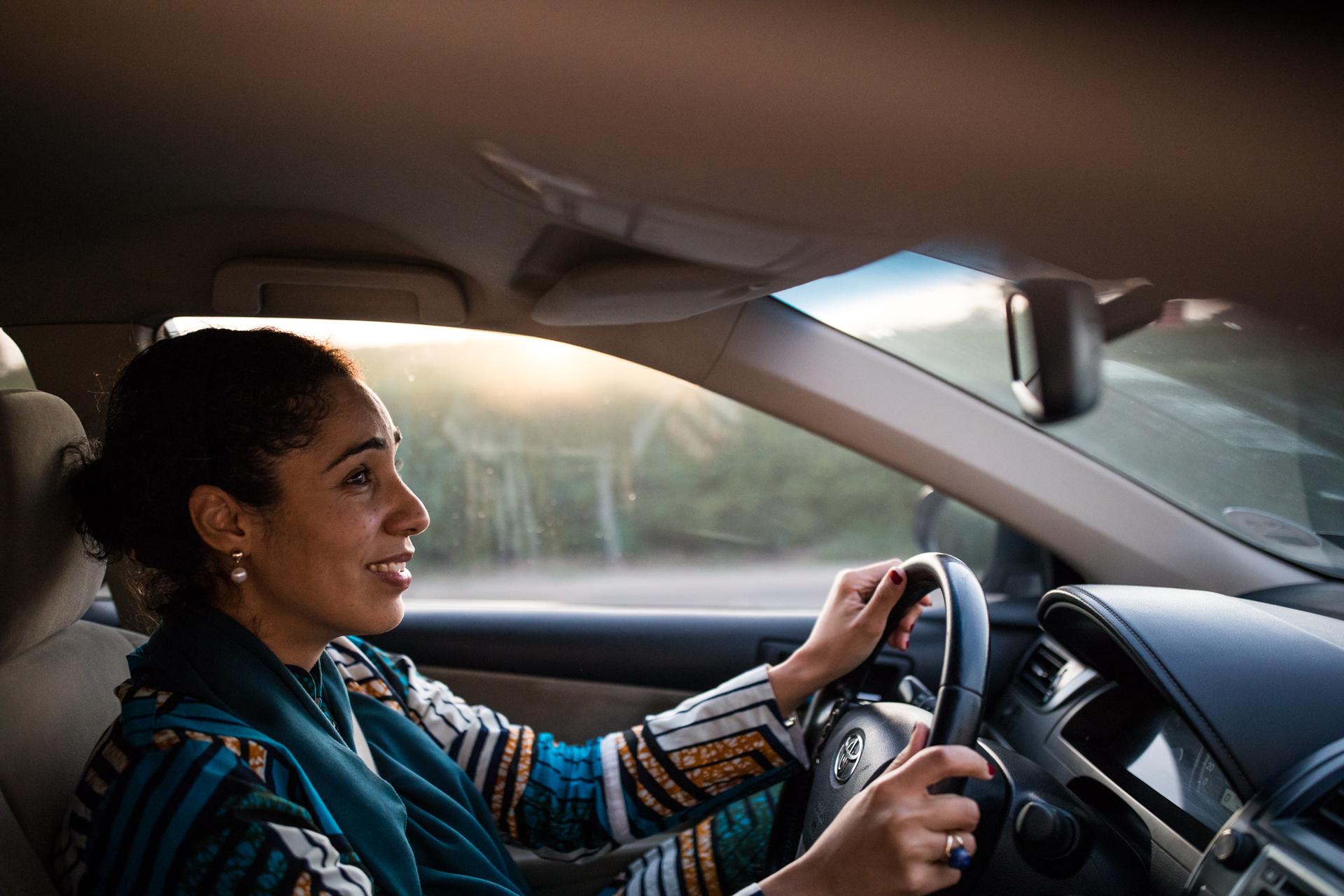Saudi women can drive. But gender equality isn’t yet ‘mainstream.’
Sharia Walker heads home after a long day at work in Jeddah, Saudi Arabia.
Last summer, when Sharia Walker got behind the wheel for the first time in Saudi Arabia, the reactions she encountered surprised her.
“Guys honk their horns and give me a thumbs-up,” she said recently, during her 25-minute commute home from work in her gray, Toyota Camry. “[There were] five kids packed up in a car, and they’re all peering through the window and waving like they’ve seen a celebrity or something.”
Walker was treated like a celebrity because the kingdom had just lifted its decades-old ban on women driving.
“I never in a thousand years imagined that one day, it would be possible for me to get behind the wheel and drive myself home. The status quo had been set in place for so long.”
“I never in a thousand years imagined that one day, it would be possible for me to get behind the wheel and drive myself home. The status quo had been set in place for so long,” said Walker, who lives in Jeddah.
The lifting of the ban has improved life for some Saudi women like Walker — they can get themselves to work or even take a job that involves lots of driving — while others say they are ambivalent about it or would rather women stay off the roads. The change has also come at great cost for activists who began fighting for this cause back in the 1990s.
Until last summer, Saudi Arabia was the only country in the world where women weren’t allowed to drive, a policy that had been in place since 1957. The ban’s origins are murky, but the country follows Wahhabism, a strict form of Sunni Islam, which, among other things, forbids the sexes to mix. Saudi clerics argued that allowing women to drive would lead to promiscuity.
But in September 2017, Saudi Arabia’s ruler, King Salman bin Abdulaziz al-Saud, issued a decree announcing that the nation’s women could drive starting on June 24, 2018. This was an extraordinary moment for women in the kingdom. Many had long fought for that right.
Some analysts view this change as a direct result of the crown prince’s vision to revamp the economy. In 2016, only 1 in 5 Saudis employed in the kingdom were women — extremely low compared to other parts of the world.
The ban has been widely condemned as a major barrier against women’s empowerment in the kingdom and a symbol of oppression. Some rights organizations hoped the ban’s removal would lead to more action on gender equality in Saudi Arabia.
But last May, in the lead-up to the lifting of the ban, more than a dozen female activists who had pushed for the right to drive were rounded up and put in jail. At least nine of them remain in prison. Families of the activists say they have been tortured and put in solitary confinement for long periods. No formal charges have been brought against the women, only a series of allegations that accused them of having been involved in a foreign plot against the government.
The World reached out to one activist’s family, who declined to comment at this time.
Related: Saudi Arabia isn’t known for fun. It has a $64 billion plan to turn it around.
“We have received reports that several activists including women’s rights activists were tortured, ill-treated and sexually abused during the first three months of their detention,” said Dana Ahmed, Middle East and Gulf researcher for Amnesty International. “Several activists reported that activists received electric shocks, were flogged and beaten and one activist wasn’t able to stand or walk properly according to her family who saw her.”
Amnesty International, along with other human rights groups, have called for an independent investigation into the claims and the activists’ release.
“It’s quite ironic that these arrests happened one month before the driving ban was lifted because these women are not only human rights defenders but [they] were the leading campaigners in the campaign for the right to drive.”
“It’s quite ironic that these arrests happened one month before the driving ban was lifted because these women are not only human rights defenders but [they] were the leading campaigners in the campaign for the right to drive,” Ahmed said. “It sends the message that reform and critique will only come from the government.”
The World tried contacting Adel al-Jubeir, the Saudi minister of state for foreign affairs, but his office declined to comment. During his recent visit to Washington, DC, he publicly said the detained women’s rights activists will be put on trial and that their case is about “national security, not activism.“
Historically, Saudi women relied on male relatives to get from place to place, or hiring chauffeurs. Public transport was not an option for many since it remains underdeveloped.
That’s something Walker can attest to. She was born to an American father and an Italian mother in Saudi Arabia, and growing up, she says, getting from one place to another was a headache. Her family couldn’t afford a driver so she relied on public transportation.
“But we didn’t have buses or metro or a system in place,” she said. “So, you had to depend on taxi drivers. And taxi drivers, they’re quite expensive, it’s not reliable, often it’s not very clean. So, it was just so inconvenient.”
“Even with your driver, you’re kind of saying, ‘Can you take me?’ He could say, “No, I’m feeling sick,” or he could [be in] a bad mood.”
Later on, Walker was able to hire her own driver, but she still wished she could be more independent and drive herself to and fro. “Even with your driver, you’re kind of saying, ‘Can you take me?’ He could say, “No, I’m feeling sick,” or he could [be in] a bad mood.”
In 2017, Saudi media reported that families spent as much as $540 million each month on drivers.
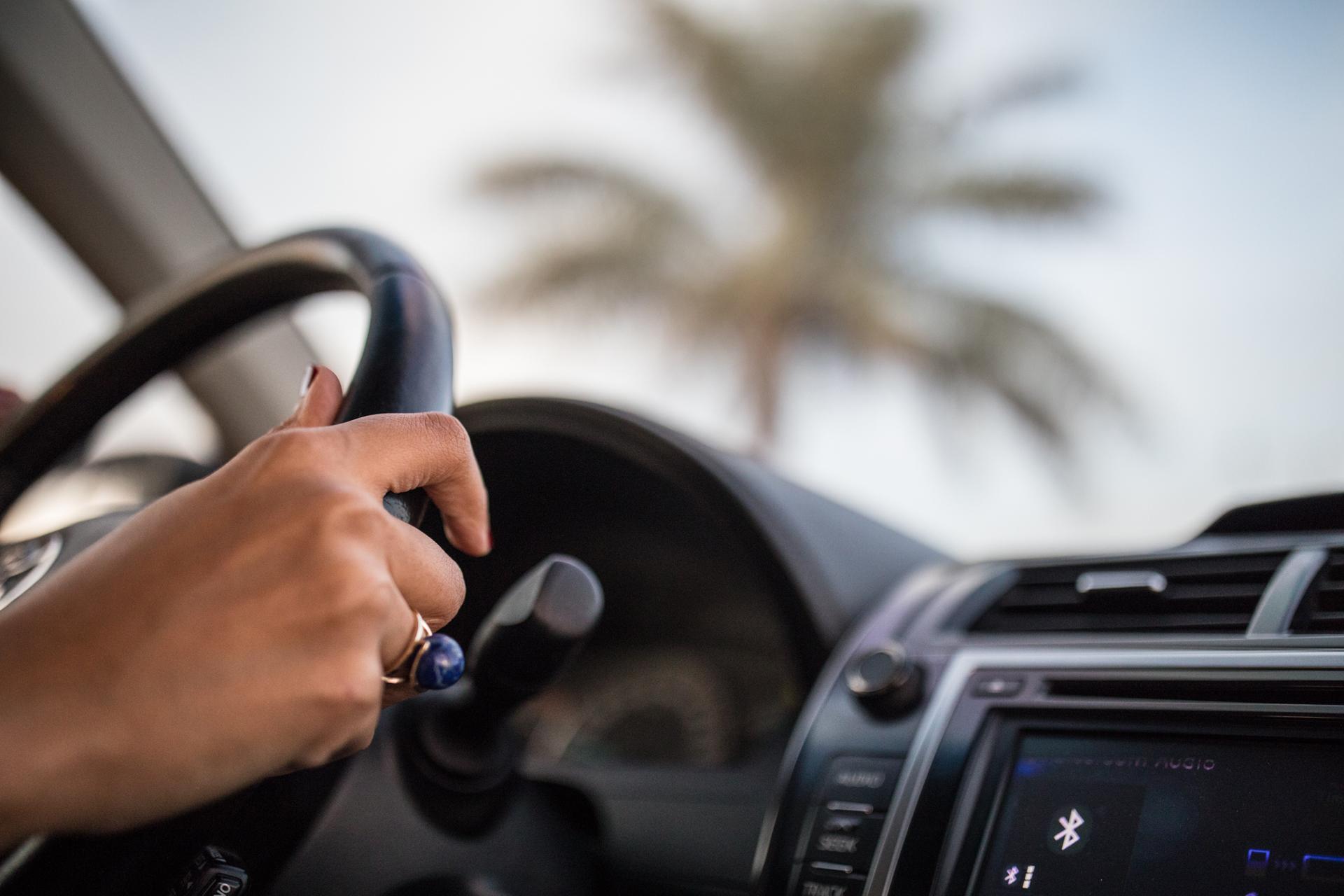
Walker was euphoric when the ban was first lifted — “For me, it means so much to be able to freely move around.”
But she would like to see this moment as the start of a more systemic change in the kingdom.
While women can drive, they still have to follow guardianship rules that require them to get the permission of a male relative for tasks such as travel, marriage and some health procedures.
“The idea of women equality has to be mainstream, not limited to driving. If we want to see real change it has to continue. This is the first step in the right direction.”
“The idea of women equality has to be mainstream, not limited to driving,” she said. “If we want to see real change it has to continue. This is the first step in the right direction.”
Additionally, Saudi women drivers are still few and far between. According to Saudi media, more than 40,000 driver licenses have been issued to women since last June, while around 10 million adult women live in the country. The driving age is 18.
Walker encourages women to get a driver’s license. “I’ve made it my job to engage with [women] every time I see an opportunity. I ask them, ‘What do you think about this? Have you applied for your driver’s license yet?’ Because I think that conversation is important to have.”
Some Saudi women still have plenty of questions: “There was a decree that women are allowed to drive and that was it. From my experience, I haven’t seen any platform where people can engage and discuss what to expect, what are the fears, does it make sense?”
Listen to more from Walker:
Only a few miles away in Jeddah, Esraa Samman parked her company car near a restaurant. As a sales representative at a hygienic products company, Samman is there to negotiate a possible deal.
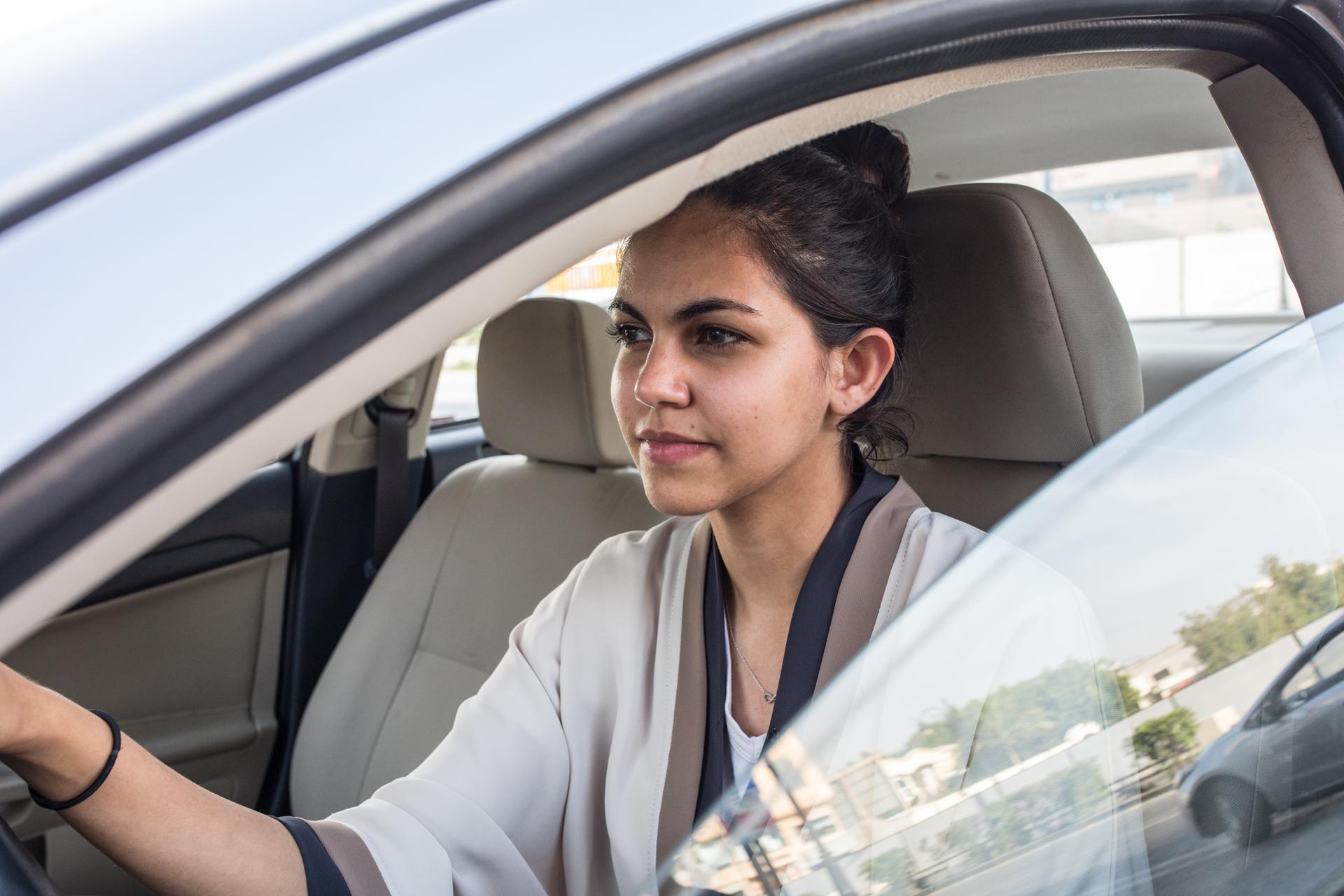
“My [job requires] me to be working from the streets, on the site,” she said. “So, every day, my routine is to take the car, go to the office for 30 minutes to an hour for meetings, for things on the computer, and then after that, I take my car and visit clients.”
Samman is the first female sales representative of the company — a major accomplishment. She got her driver’s license when she studied architecture in the US, at Boston’s Wentworth Institute of Technology. She drove her father’s car in Boston, and when she returned to Saudi Arabia, she took the road test and got her license.
Samman didn’t know what to expect on the roads in Saudi Arabia, which are known for congestion and a high number of deadly accidents.
“In the beginning, I was honestly scared, but as time passed, I realized that actually whenever someone sees that you are a girl, they slow down and let you go first.”
“In the beginning, I was honestly scared, but as time passed, I realized that actually whenever someone sees that you are a girl, they slow down and let you go first,” said Samman, whose younger sister has also signed up for driving classes.
Samman says allowing women to drive has benefited not just women in Saudi Arabia, but businesses, too. Since she started in this position, she has been able to connect with clients her male colleagues couldn’t.
“As a girl, I am trying to introduce our products to beauty salons, female gyms because I know our department is lacking on that due to the females not driving.”
Although it can be nice to have a chauffeur, she said, it’s also “nice to feel like this is a choice and not something you can’t go against.”
Listen to more from Samman:
“I have been teaching my sister how to drive a car and she is learning fast. Actually, one night, my mother was sick, and she took her to the hospital. The hospital is very close to our home, but it was late at night and that was a good thing to do. I felt proud.”
Some men, too, support women driving. Like 32-year-old Asir, a barista at the Nabt Fenjan Coffee shop in Riyadh: “I have been teaching my sister how to drive a car and she is learning fast. Actually, one night, my mother was sick, and she took her to the hospital. The hospital is very close to our home, but it was late at night and that was a good thing to do. I felt proud.”
Meanwhile, some Saudi women say they are ambivalent about women driving.
Fifty-year-old May, who gave only her first name, was shopping at a local market in Riyadh. She thinks the media is making a big deal out of the lifting of the driving ban.
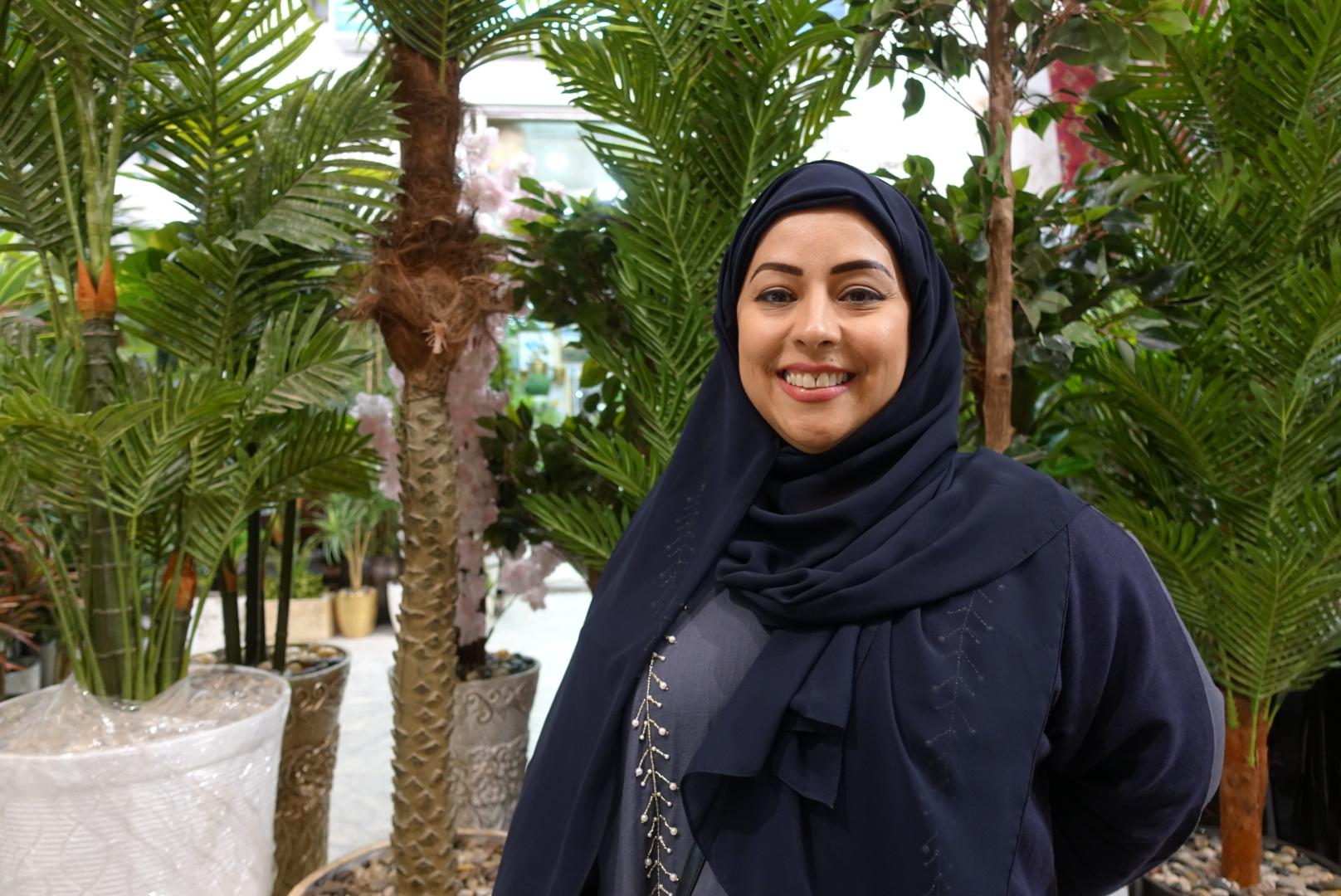
The writer and poet from Riyadh says the driving ban hasn’t made a significant change in her life. She has kept her driver and commutes the way she used to.
“I don’t want to drive. I have a driver, like a princess. I don’t look for parking; I don’t clean my car, I don’t place petrol [in the car].”
“I don’t want to drive. I have a driver, like a princess. I don’t look for parking; I don’t clean my car, I don’t place petrol [in the car],” she said.
In fact, May thinks the changes in the kingdom are coming too fast.
“The new generation likes for changes to happen quickly, but for me, I lived in the same level for 50 years. I like everything step by step. Maybe it’s my age,” May said with a giggle.
Listen to more from May:
In the meantime, Walker is thinking about getting a new car, a Tesla maybe. The only problem is that there aren’t enough charging stations in the kingdom. But she has read about smaller charging stations that owners can have at home.
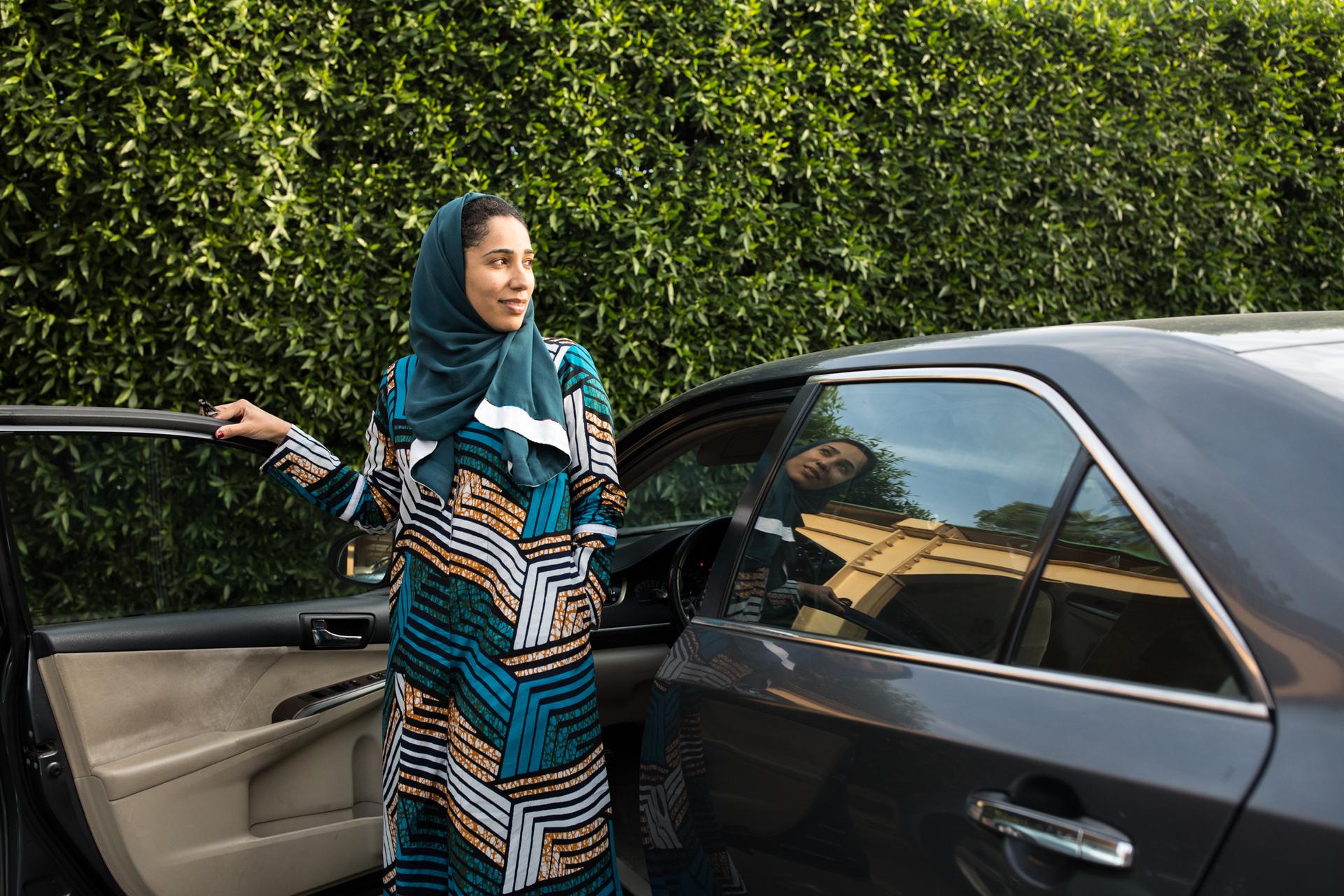
“But they’re still quite expensive,” she said, thinking aloud. “Still, I’m looking into it. Maybe a birthday gift.”
Her birthday is on the Fourth of July. Or as she puts it: “Independence Day, baby.”
Editor’s note: The Saudi government requires visiting reporters to be accompanied by a government minder.
